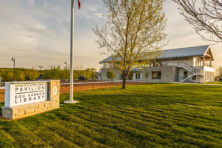Door County Tourism Zone Decision Puts Onus on City of Sturgeon Bay
- Share
- Tweet
- Pin
- Share
The Sturgeon Bay City Council voted 4-3 against the city joining the Door County Tourism Zone at their July 1 meeting, and decided to table discussion of joining the zone for a year. It appears that decision is going to have major consequences for the city’s businesses.
The council’s decision, according to Tourism Zone Commission (TZC) chairman Bob Kufrin, left the commission no choice but to cut the city out of marketing paid for by room tax dollars.
“Last year we were still trying to organize and it seemed fair to allow communities a little time to determine if they wanted to join the zone,” Kufrin said. “But now we’re established, and there’s no reason not to follow the statute as defined by the state.”
Kufrin said the statute is clear on how the Door County Visitor Bureau (DCVB) can use room tax dollars.
“DCVB members that aren’t in the zone can’t use services paid for by the room tax,” he explained. “Sturgeon Bay has decided they don’t want to consider joining for another year, so we had to make a decision.”
The commission gave non-zone municipalities until Dec. 31 (20 months into the tourism zone’s existence) to join the zone, at which point they can no longer be included in marketing efforts paid for by room tax dollars.
Visitor bureau President and CEO Jack Moneypenny agreed with the commission’s decision, but feels for DCVB members who will be left out in the cold, some after decades of membership.
“Obviously, we would like to maintain our membership,” Moneypenny said. “But for us to risk our funding by violating state statute isn’t feasible.”
There are 152 businesses in the city that are members of the DCVB, contributing an estimated $150,000 annually to the bureau in dues and advertising.
Sturgeon Bay officials were dismayed by the commission’s decision.
Todd Trimberger, Executive Director of the Sturgeon Bay Visitor Center (SBVC), said the action caught him off guard.
“Obviously it took us a bit by surprise in that it became such an urgent issue,” he said.
The visitor bureau articulated the possibility that non-zone communities would eventually lose benefits at an informational forum at Third Avenue Playhouse in March of his year. More than 40 business owners attended that session, but no officials from the city showed up.
Trimberger, like others in the city, felt they were still making progress toward joining the zone. But the TZC decided that after waiting 16 months for Sturgeon Bay to make a decision, the commission wasn’t prepared to wait another year with no guarantee Sturgeon Bay would ever join.
Sturgeon Bay Mayor Tom Voegele said he was surprised by the decision, but acknowledged the city has been slow to take action.
“I think we are working toward it,” the first-term mayor said. “I know it’s at a turtle’s pace, but council members are warming up to it. I’m just hoping the two sides don’t just dig in their heels at this point. I think it’s important we join the zone, the dilemma is how.”
The SBVC is in favor of joining the zone, but some of the organization’s 220 members have expressed concern that if the city joins the tourism zone it could result in the elimination of city festivals.
Voegle said he is in favor of the city joining the zone and giving up its share of the room tax (in 2007 the city would have taken in nearly $140,000 with a 5.5 percent tax) to fund the SBVC. He admitted the city may have erred in putting off a decision.
“The meeting when we tabled discussion for the next year probably sent the wrong signal,” he acknowledged. “Maybe we need to be pushed along a little.”
Moneypenny agreed.
“The Sturgeon Bay City Council saying they’re going to table this for a year says they’re not continuing to move forward,” he said. “A date needed to be established to work toward.”
Moneypenny has repeatedly stressed that it’s imperative Sturgeon Bay join the zone, as his organization currently has to tiptoe around promoting the city with room tax dollars.
“It’s not the volume of dollars,” he said, “it’s about a unified product and telling the whole story of Door County.”
Trimberger said he felt the city was being “bullied,” and that even though the city had tabled discussion, work on finding a solution had not stopped.
“That’s why we asked them to raise the city room tax rate,” he explained. “We felt that was a baby step to get to the end product.”
The city voted to raise its room tax from 4 to 5.5 percent Aug. 19 to be in line with the zone and also voted to cap the city’s share of the room tax dollars at $100,000. If the changes had been in place in 2007, the SBVC would have taken in an additional $39,250.
Trimberger said it was not unreasonable to have a timeline for a decision, but that a four-month window was too short to get everything done. He said a reasonable grace period would extend to July 31 of next year, essentially what the city council decided. The TZC, however, has made it clear that a one-year grace period is not acceptable.
Greg Stillman has been involved in the process throughout, as a lodging manager and as a board member of both the SBVC and the DCVB. He left the SBVC board at the end of his term in April, but said a lot of energy went into trying to bring all the parties together.
“The city has to realize it’s important to look at the potential return on investment in tourism,” he said, adding that the action taken by the commission didn’t come as a surprise to him.
“[The Council] knew these were the potential consequences of not joining the zone.”


